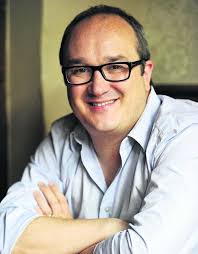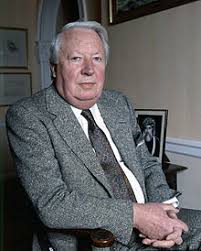An examination of post-war Britain.
The lecture series which students attend to enhance classroom teaching in subjects such as History or English are of immense value in enhancing and enriching the girls’ classroom experience. The latest visit was that of the Lower VI History pupils to attend history lectures. Caitlin Parry, Lower VI, here reports on their experience.
‘On Monday 18th March, the Lower VI historians headed into Central London to attend lectures taking place at the London Irish Centre in Camden. These lectures, given by historian and author Dominic Sandbrook and Dr Rob Waters, lecturer in Modern British History at the University of Birmingham, discussed much of what is on the syllabus we are learning as part of our A Level course, focusing on post-war Britain.

Dominic Sandbrook Dr Rob Waters
The first two lectures, by Dominic Sandbrook, talked about the 1980s and the premiership of Ted Heath in the early 1970s. Although these two time periods can be seen in separate lights there is also a very strong link between them. The reason behind this is the impact that Heath had on Margaret Thatcher’s government with the discussion centering around the idea that Heath was Thatcher’s John the Baptist, concluding that without the former’s failure, the latter would not have succeeded. Sandbrook also looked into whether or not the 1980s, as we know them, would have happened without Thatcher. This is a moot point as the change that took place in identity and the increased usage of computers cannot be attributed to Thatcher. However, it is impossible to think about the 1980s without thinking about Thatcher and the dramatic impact that she had, whether one believes it to be cataclysmic or glorious. On this note, it must also be mentioned how Sandbrook discussed the marmite effect of Thatcher, expressing a slightly pro-Thatcher point that although the change that she brought about was also happening in areas such as the USA under President Ronald Reagan, the reason why she is so hated is because she was a woman. This was interesting for the students because for the A Level course it is necessary to pay more attention to what she did and its effects, good or bad, and put previous feelings about her to one side.


Prime Minister Edward Heath Prime Minister Margaret Thatcher President Ronald Reagan
The second set of lectures was given by Dr Rob Waters and focused on the decade of the 1970s as well as race and immigration in post-war Britain. The first of these lectures, on the 1970s, concentrated on much of what is on the A Level history syllabus, discussing the crisis that took place in this decade owing to tensions such as the one between the government and the trade unions. In addition to this, Dr Waters also discussed the crisis that was taking place in different parts of society at the time, not only economically speaking but also culturally and ideologically. This will come in useful for our future examinations as it helped to give us a greater understanding of the 1970s as a whole. The second lecture of this set, as aforementioned, was on race and immigration and enforced what had already been taught to us in our lessons. As well as this, however, there was also talk on how today, if someone mentions the Empire Windrush, the immediate thought is mostly of the scandal that arose over a year ago and how this has given many a different perspective to the treatment of immigrants to twenty years ago.
Overall, the visit was an enlightening experience that has done much in cementing into our long term memory what the Sixth Form have learned as well as increasing our general appreciation and knowledge of the time period we have been studying.’
Categories: Sixth Form Whole School




